Share
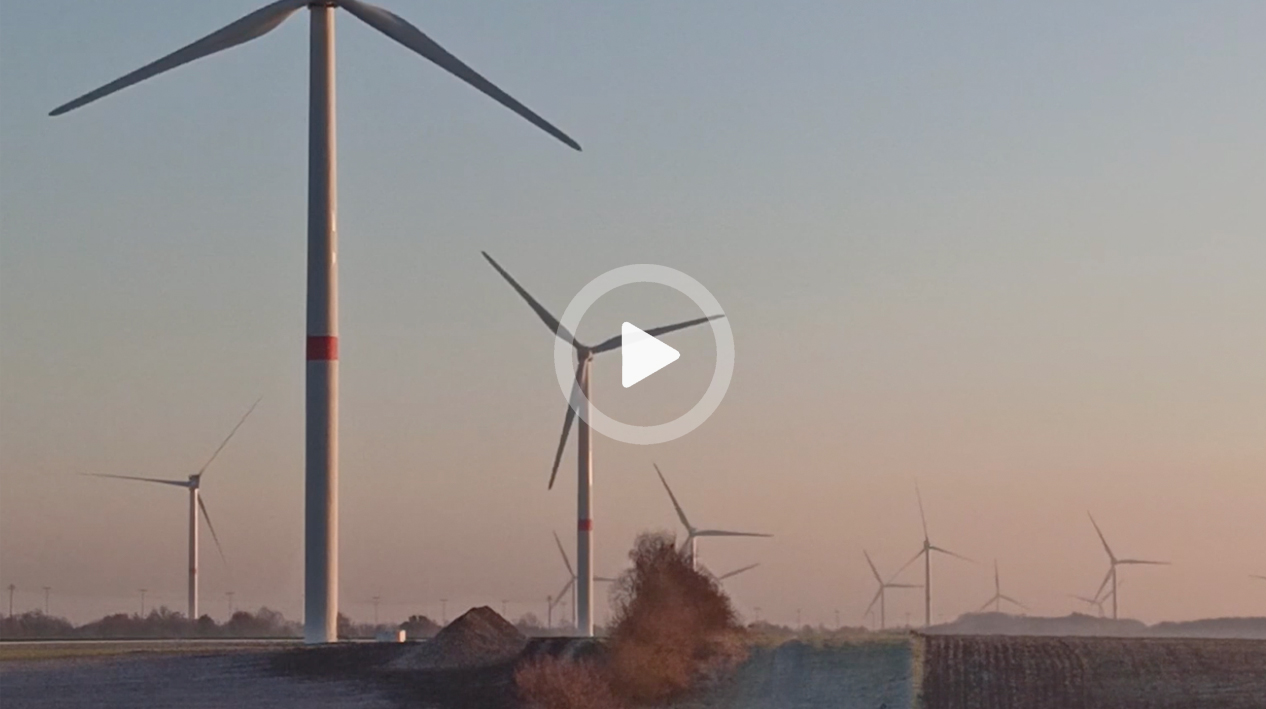
Main Conclusions
6 key takeaways

Awareness around climate issues has been reaffirmed, with 85% of mid-market companies considering the reduction of GHG emissions as “important” or “critical”. This maturity is increasingly infusing corporate strategy as decarbonisation becomes their top environmental priority.
The awareness among European mid-market companies is still high, as 85% see the reduction of GHG emissions “important” or “critical” (+1pp compared to 2023). The EU mid-market community is likely to have now embraced the materiality of climate across sectors and geographies.
Among the 85% of respondents who consider GHG emissions reduction as crucial, 80% report that they are actively incorporating these efforts into their corporate strategies, representing a significant rise of +11pp versus 2023. This highlights an increasing maturity on decarbonisation topics which is concretely translated into specific environmental objectives.
Regulation on non-financial disclosure is becoming central to European policies and is expected to elevate investors’ requirements, ultimately triggering action. The awareness and perception of upcoming regulations such as the CSRD(1) varies according to the size of the companies. In particular, 28% of mid-market companies with less than 250 employees report being unaware of these regulations.
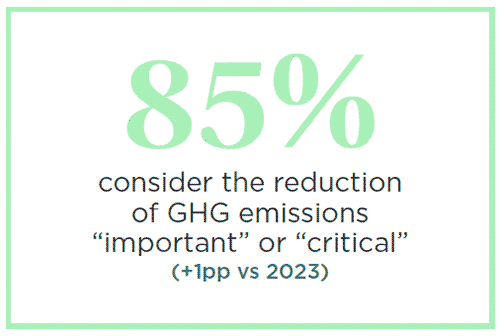

The potential benefits of the climate transition remain significant, with 67% of them viewing decarbonisation as an opportunity, although they are slightly less evident than last year (-4pp vs. 2023). Although dynamics at country level may vary, the disparity between countries is narrowing (11pp gap, down 15pp from 2023), suggesting that a consensus might be emerging.
Whereas they remain still mostly optimistic, Italy (73%) and France (67%) are showing more caution than last year (respectively -13pp and -6pp), while Germany (68%) and the Benelux (62%) are gaining confidence (respectively +5pp and +2pp).
Discrepancies are also observed across sectors, with the Agriculture & Food industry standing out as the sole sector that significantly perceives decarbonisation as a constraint (33%) and a risk (9%), rather than an opportunity. This exception echoes with the recent protests across the EU and the food security and sovereignty matters coming back in the spotlight at the expense of some of the Green Deal’s ambitions in the agriculture sector.
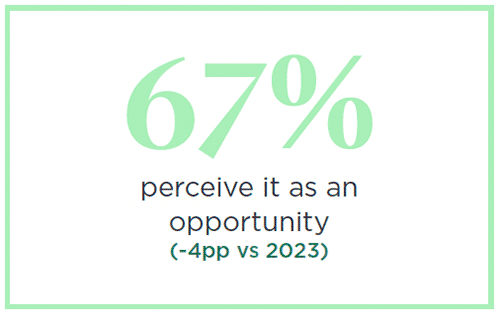

Mid-market companies have accelerated in structuring their decarbonisation. The share of respondents that “strongly” invested in climate transition based on a structured decarbonisation plan grew from 11% last year to 17% in 2024. The Transportation & Logistics sector is demonstrating the highest maturity among our respondents.
Mid-market companies are demonstrating an increased maturity in the decarbonisation process. A mounting part of them invest following a structured decarbonisation plan (17%, +6pp vs. 2023), which includes measuring their baseline GHG emissions and building a roadmap, likely facilitating better calibration and tracking of efforts to reduce emissions.
The share of mid-market companies which did not start any planning nor action on GHG emissions reduction, is decreasing (-5pp) down to 22% of the respondents, likely driven by increasing societal and regulatory pressure to start acting on decarbonisation.
Among other sectors, Transportation and Logistics stands out with the highest proportion (27%) of mid-market companies having invested along a structured decarbonisation plan, and the lowest share (16%) that did not start any planning nor action on GHG emissions reduction. While these results are showing a steady progress, further support is needed to make the more sceptical companies close the gap.
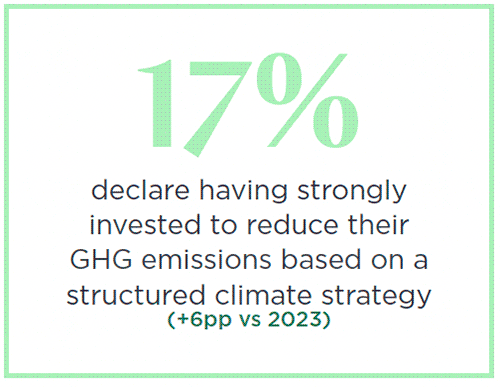

A growing number of midmarket companies declare they are strongly investing in decarbonisation (43%, +5pp vs. 2023), still primarly driven by regulatory pressure and rising energy prices. Beyond these factors, companies are increasingly motivated by client demand and additional economic benefits such as cost savings, market share expansion, and attracting talent.
Greater maturity on decarbonisation topics seems to be leading to a higher proportion of companies taking concrete action to reduce their GHG emissions, with 43% of respondents in 2024 actively engaging in these efforts (+5pp vs 2023).
Nevertheless, only few mid-market companies have shifted towards more transformative actions, as 80% of the respondents dedicated less than 10% of annual CAPEX to the reduction of their GHG emissions. Most of them continues to focus on the most actionable levers, such as energy efficiency and employee engagement.
Main drivers motivating investments of European midmarket companies remain regulation (72%) and rising energy prices (62%). Companies also face growing pressure from their clients (56%, +5pp compared to last year), especially in B2B value chains as large industrial companies are increasing the prerequisites for tier-1 and tier-2 suppliers to reduce their carbon footprint. Some sectors are particularly sensitive to the client pull such as Transportation & Logistics (60%, +6pp vs 2023), Construction (59% +12pp), Agriculture and food (59%, +4pp) and Chemicals (51%, +11pp).
Beyond regulatory factors, mid-market companies are increasingly pushed to action by the potential economic benefits of decarbonisation efforts. Main positive effects include optimized energy efficiency and associated costs (58%, +4pp vs 2023), opportunity to gain market share (54%, +3pp) and attraction of new talents (40%, +15pp).

Decarbonisation dynamics diverge across countries, with mid-market companies from France and Benelux ramping up their investments (resp. +12pp and +10pp), while Germany and Italy were closer to last year (resp. +2pp and -4pp). At sector level, Agriculture & Food, Retail & E-Commerce, as well as Transportation & Logistics show the strongest acceleration of investments in their climate transition.
The investment dynamics of European mid-market companies are decoupling from 2023 to 2024, displaying heterogenous trends across countries and sectors. Several regions are rapidly intensifying their efforts, with share of mid-market companies that have “strongly” invested increasing over 10pp since 2023 in France, Benelux, whereas this share remains rather stable in Germany and Italy.
Such trend is also evident at sector level, with an increasing number of mid-market companies investing towards decarbonisation in Agriculture & Food, Retail & E-commerce, and Transportation & Logistics (resp. growing by +7pp vs 2023) while a more cautious wait-and-see approach is prevalent among other sectors such as Construction or Chemicals.
This rise in variability across sectors and geographies compared to the previous year could be an early sign of divergence in the economy, where some companies strive for climate leadership while others are delaying decisions amidst increasing uncertainties.

The lack of in-house resources has emerged as the dominant obstacle to mid-market companies’ decarbonisation efforts (now quoted by 46% of the respondents), while financial and regulatory hurdles are considered less prohibitive. This highlights the critical need for support, training, and change management from the whole ecosystem for achieving a successful transition.
The scarcity of in-house resources now is the main barrier to decarbonisation for mid-market companies (46%) and even more for mid-market companies that have not yet started any planning or action on GHG emissions reduction (53%). This underscores the vital need for dedicated, trained human resources to address the challenges of the transition process, particularly for companies at the early stages of decarbonisation.
The slowdown of lack of financial resources (-13pp), ROI uncertainty (-8pp), and regulations complexity (-11pp) as headwinds towards decarbonisation is a positive sign. Nevertheless, they still are quoted respectively by 44%, 37% and 44% of the respondents. Regulators, investors, governmental agencies, business partners and solution providers need to sustain their efforts for ensuring a successful transition of small and mid-market companies towards sustainability.
Awareness around climate issues has been reaffirmed, with 85% of mid-market companies considering the reduction of GHG emissions as “important” or “critical”. This maturity is increasingly infusing corporate strategy as decarbonisation becomes their top environmental priority.

The awareness among European mid-market companies is still high, as 85% see the reduction of GHG emissions “important” or “critical” (+1pp compared to 2023). The EU mid-market community is likely to have now embraced the materiality of climate across sectors and geographies.
Among this 85% of respondents, 80% now declare that they are already working on GHG emissions reduction as part of their corporate strategy, marking a significant increase of +11pp from 2023 (69%).
While fewer mid-market companies perceive pollution prevention and control as a key objective compared to 2023 (65%, -5pp vs. 2023), the necessary adaptation to climate change experienced significant increase (52%, +7pp). These results suggest a growing willingness to act for decarbonisation among European mid-market companies and a deeper understanding of climate change potential impacts using mitigation and adaptation levers.
Environmental objectives of interviewed companies
(for companies who considered the reduction of GHG emissions “important” or “critical”)

The potential benefits of the climate transition remain significant, with 67% of them viewing decarbonisation as an opportunity, although they are slightly less evident than last year (-4pp vs. 2023). Although dynamics at country level may vary, the disparity between countries is narrowing (11pp gap, down 15pp from 2023), suggesting that a consensus might be emerging.

While most respondents still view decarbonisation favourably, early signs that some business leaders start to perceive the climate transition in a more nuanced way emerge. Among the 85% of respondents considering GHG emissions reduction “important” or “critical”, 67% see it as an opportunity, down -4pp from 2023.
The perception of decarbonisation as a risk has grown to 10% (+4pp from 2023). Such evolution may be connected to the high emphasis mid-market companies place on double materiality, as 65% have conducted a full or partial impact study on climate change-related risks to their activities or value chain.
This shift might reflect the current context of uncertainty surrounding the future of climate policies and echoes an underlying trend among large companies, which start to reassess established standards and viability of ambitious climate targets. After having set initial ambitious decarbonisation objectives, notably to the SBTi, some large companies begin to recalibrate their ambition (1). Large companies, in particular, point to the complexity of measuring Scope 3 emissions as a significant obstacle in defining achievable SBTi targets. However, despite raising concerns about current feasibility of translating ambitious climate commitments into actionable decarbonisation strategies, concrete efforts are still being deployed.
Perception of the climate transition
(for companies who considered the reduction of GHG emissions “important” or “critical”)
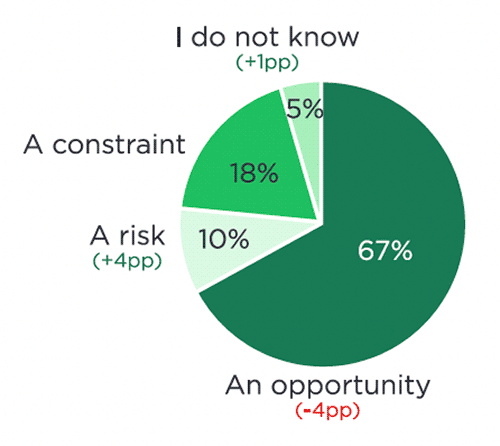
Across regions, the difference in perception of the climate transition as an opportunity is narrowing at 11pp compared to 26pp in 2023, suggesting potential emergence of consensus. Still mostly optimistic, Italy (73%) and France (67%) show more caution than last year (respectively -13pp and -6pp), while Germany (68%) and the Benelux (62%) are gaining confidence (respectively +5pp and +2pp).
Perception of the climate transition by country
(for companies who considered the reduction of GHG emissions “important” or “critical”)
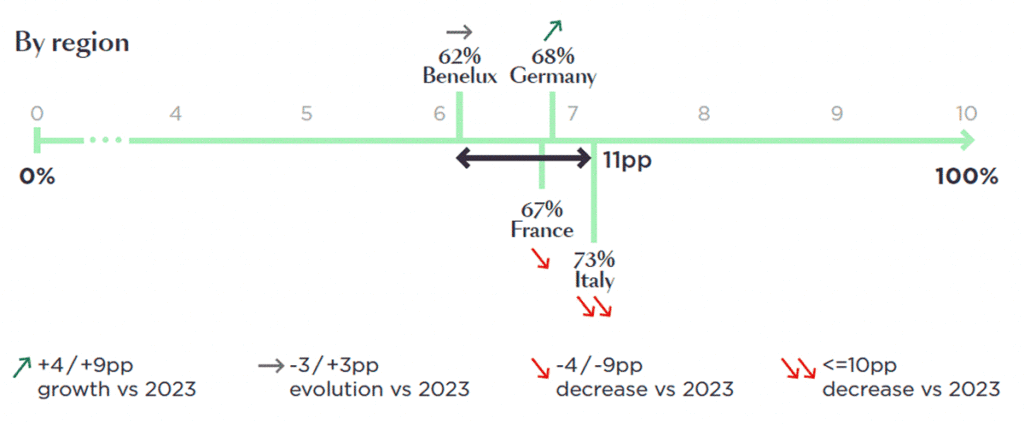
With the CSRD reporting requirements being implemented in 2024 (publishing in 2025) for companies over 500 employees and the gradual expansion to smaller companies in 2025-26, mid-market companies are beginning to recognise potential benefits of these regulations in achieving their climate goals. 41% of mid-market companies view European and national regulatory changes as essential or as a tool to structure their approach to reducing GHG emissions.
However, more than a quarter of mid-market companies (28%) with fewer than 250 employees report being unaware of the regulatory changes, suggesting a potential lack of preparation for the upcoming requirements, especially since CSRD will apply to some of them in 2026. These findings highlight the importance of supporting mid-market companies in anticipating climate policies and regulations, enabling them to fully capitalize on the benefits of decarbonisation.
Significant disparities can be observed across sectors, with Agriculture & Food industry standing out as the sole sector that significantly perceives decarbonisation as a constraint (33%) and a risk (9%), rather than an opportunity. This exception could be related to the recent protests across the EU, and the likely scaling down of Green Deal’s ambitions on agriculture, with a higher priority given to food security and sovereignty.
Perception of the climate transition, by sector
(for companies who considered the reduction of GHG emissions “important” or “critical”)
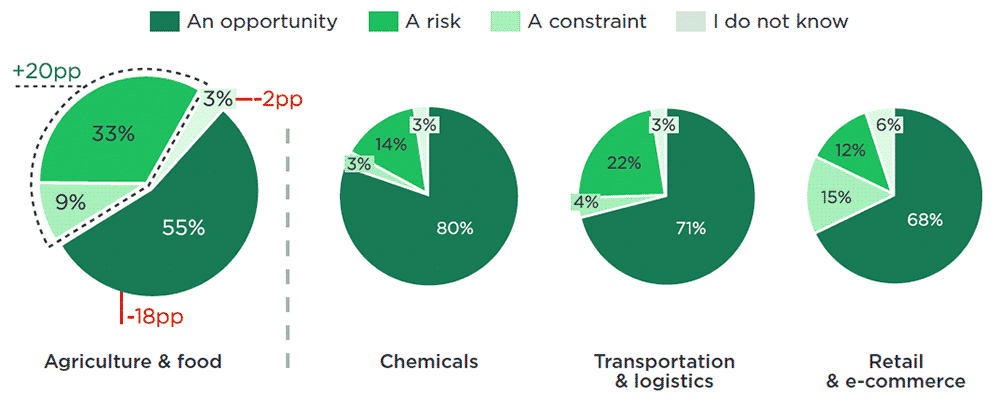
Mid-sized companies have accelerated in structuring their decarbonisation. The share of respondents that “strongly” invested in climate transition based on a structured decarbonisation plan grew from 11% last year to 17% in 2024. The Transportation & Logistics sector is demonstrating the highest maturity among our respondents.

In the 2023 Argos-BCG Climate Barometer, we observed four paths to decarbonisation based on the progressive steps taken before starting to invest. The 2024 results reveal an improvement compared to 2023, as an increasing number of mid-market companies are taking action toward decarbonisation despite the uncertain context over climate policies. 17% of respondents declare having strongly invested based on a structured decarbonisation plan including carbon footprint measure and decarbonisation roadmap (“Achievers”, +6pp vs. 2023), which may facilitate better calibration and tracking of efforts to reduce emissions. The “Laggers” segment decreased to 22% (-5pp vs. 2023), likely driven by increasing societal and regulatory pressures to start acting on decarbonisation.
The “Doers” and “Planners” segments remain relatively stable (respectively -1pp and +0pp compared to last year).
4 paths to decarbonisation
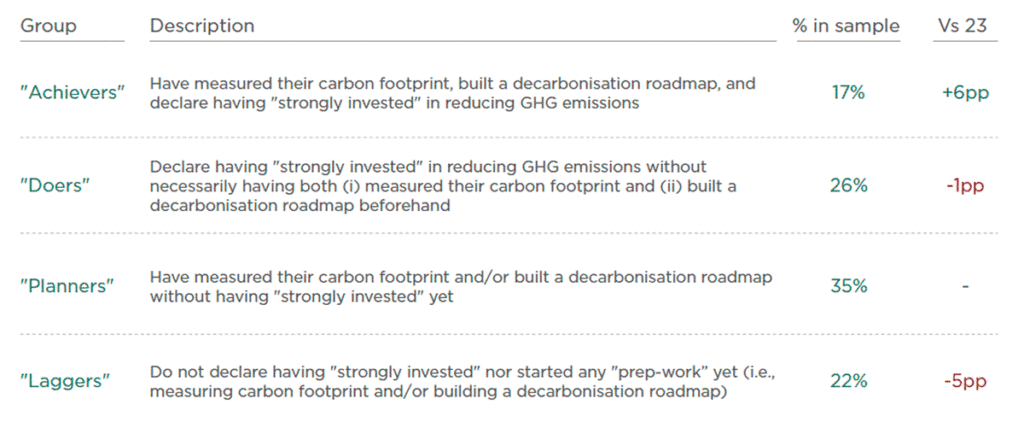
Among the 57% of companies which declare not having invested CAPEX in decarbonisation, 62% have done at least one of the 2 steps of climate strategy planning (measuring carbon footprint and / or building a decarbonisation roadmap). They now might be ready to engage in active decarbonisation.
A growing number of mid-market companies are strongly investing in decarbonisation (43%, +5pp vs. 2023), still primarily driven by regulatory pressure and rising energy prices. Beyond these factors, companies are increasingly motivated by client demand and additional economic benefits such as cost savings, market share expansion, and attracting talents.

European mid-market companies declare they are increasingly investing in decarbonisation compared to last year, with 43% (+5pp vs. 2023) of respondents having already “significantly” invested (up to 10% of their annual CAPEX) or “strongly” invested (more than 10%). Most of them (80%) have not started to commit more than 10% of their annual CAPEX to decarbonisation.
Levels of investment deployed in GHG emissions reduction
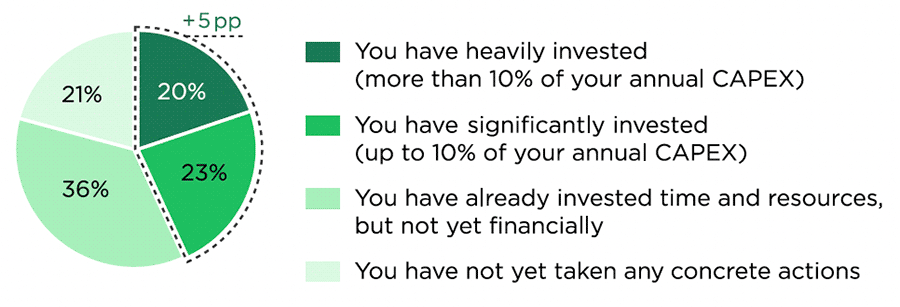
Companies continue to focus on “quick wins” in their decarbonisation journey, notably through the implementation of energy efficiency measures (73% of respondents) – also offering economic benefits amidst the energy crisis – development of awareness among employees (66%) and influence over day-to-day work practices (58%). No significant shift has been observed towards strategies that heavily impact the operating model across value chains, nor towards transformative actions that require substantial investments and time.
Decarbonisation levers used by respondents over the last 12 months

The primary motivators for small and mid-market companies to invest in decarbonisation remain consistent with last year, with 72% of respondents citing regulatory changes and 62% pointing to energy prices as the key drivers. This was fairly expected: even though both European and national regulations continued to build up in 2023 (including upcoming deadlines such as CSRD), most of the climate policies in place were already foreseen last year. On the other hand, tension on energy supply eased up in 2023, but prices remained high compared to pre- Ukrainian war period. This suggests that European mid-market companies may be structurally engaging in GHG emissions reduction rather than reacting to temporary market challenges.
Decarbonisation drivers
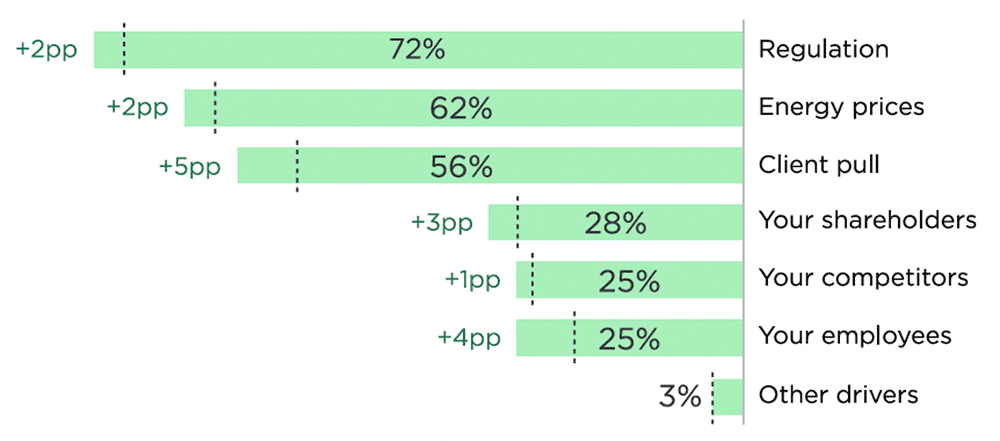
The third main driver, “Client pull”, is increasingly quoted by 56% of respondents (+5pp compared to last year) as a motivation to initiate decarbonisation efforts. The pressure is particularly mounting on companies that primarily serve B2B clients (+4pp vs. 2023) as large industrial companies are increasing the prerequisites for tier-1 and tier-2 suppliers in order to reduce their carbon footprint.
When examining companies primarily serving B2C clients, the influence of “client pull” appears relatively stable and slightly less critical, affecting 47% of respondents. This trend may relate to current sustainable purchasing behaviours, where customers’ concerns about sustainability do not always translate into willingness to pay a premium for sustainability.
From an industry perspective, “client pull” has emerged as a major decarbonisation driver for various industries such as Transportation & Logistics (60%, +6pp vs 2023), Construction (59% +12pp), Agriculture and food (59%, +4pp) and Chemicals (51%, +11pp).
% of respondents quoting “Client pull” as a decarbonisation driver
(by % of B2B turnover and by sector)

Beyond regulatory drivers, mid-market companies are increasingly motivated to act by the potential economic benefits of decarbonisation efforts. The ability to optimise energy efficiency and associated costs as well as gain market share remain the primary positive effects linked to midmarket companies’ decarbonisation effort (58% and 54% respectively). However, recruitment attractiveness has significantly grown and now ranks among the top three positive effects, quoted by 40% of respondents compared to 25% in 2023. This highlights how decarbonisation can provide mid-market companies with a competitive edge in attracting talents, especially within a context of talent shortage, where candidates are increasingly sensitive to their employers’ engagements.
From a broader perspective, the benefits of the decarbonisation process observed in mid-market companies are mirrored in large companies (1), which primarily report lower costs, increased revenues, and an enhanced ability to attract talent as the main benefits.
Options quoted as part of the three main decarbonisation positive effects
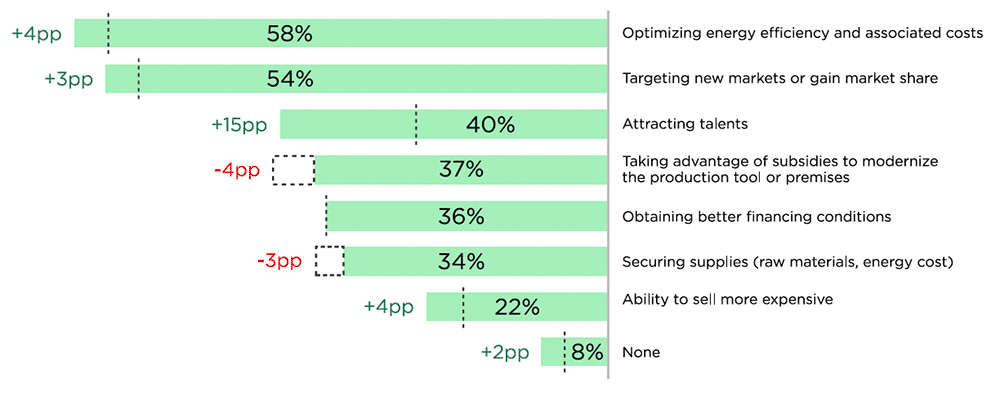
Decarbonisation dynamics diverge across countries, with mid-market companies from France and Benelux ramping up their investments (resp. +12pp and +10pp), while Germany and Italy were closer to last year (resp. +2pp and -4pp). At sector level, Agriculture & Food, Retail & E-Commerce, as well as Transportation & Logistics show the strongest acceleration of investments in their climate transition.

43% of mid-market companies declare having “strongly” or “significantly” invested to reduce carbon emissions, growing by 5pp compared to 2023, although this result still needs to be deaveraged at country and sector level.
Compared to 2023, countries exhibited two types of investment dynamics : France and Benelux saw accelerated investments, with the share of mid-market companies reporting having strongly and significantly invested growing respectively by 12 and 10pp. Germany and Italy adopted a more wait-and-see stance, with closer levels to last year, showing changes of +2 and -4pp respectively.
The variability observed in investment positions among midmarket companies from different countries and sectors compared to 2023 may indicate a decoupling trend within the business community, as some companies pursue climate leadership while others postpone decisions due to rising uncertainties.
Share of respondents declaring having “strongly” (+10% of turnover) or “significantly” (up to 10% of turnover) invested to reduce GHG emissions
By Region
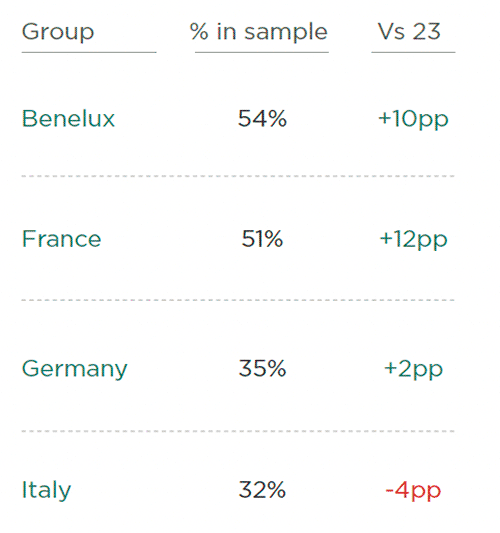
Investment dynamic is positive at sector level, as share of mid-market companies reporting strong or significant investments is growing across industries, especially Agriculture & Food (+14pp), Retail & e-commerce (+9pp) and Transportation & Logistics (+ 7pp).
Share of respondents declaring having “strongly” (+10% of turnover) or “significantly” (up to 10% of turnover) invested to reduce GHG emissions
By Sector
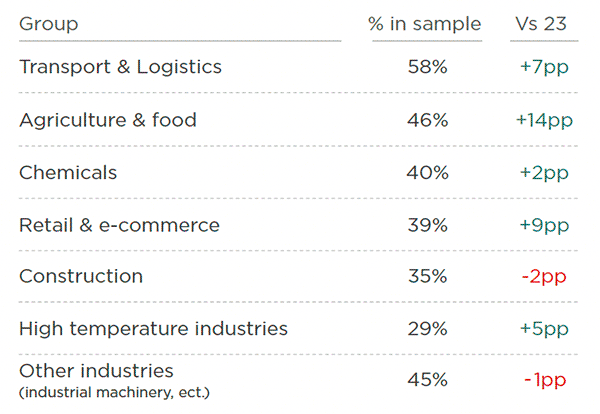
When analysing investments by ownership, private companies are catching up with their listed peers, with the share of mid-market companies reporting strong or significant investments increasing by +6pp compared to 2023, amounting to 41% versus 61% for listed peers.
The lack of in-house resources has emerged as the dominant obstacle to mid-market companies’ decarbonisation efforts (now quoted by 46% of the respondents), while financial and regulatory hurdles are considered less prohibitive. This highlights the critical need for support, training, and change management from the whole ecosystem for achieving a successful transition.
The lack of in-house resources stands out in 2024 as the main obstacle to mid-market companies’ decarbonisation being quoted by 46% of respondents, further reaching 53% for companies that did not start any planning or action on GHG emissions reduction. While more and more mid-market companies are considering financial, regulatory, and technical hurdles as decreasing, this emphasises the crucial need for adequate resources (being time or expertise) to initiate and orchestrate the entire decarbonisation process.
These findings are aligned with our field experience at the side of European mid-market companies. While more and more mid-market companies are eager to begin their decarbonisation processes, many still struggle with determining the specific steps to initiate this journey. The efforts of building a comprehensive decarbonisation plan, which aligns with the company’s strategic roadmap, the complexity of selecting the appropriate service providers among a (sometimes) crowded market, managing the funding, and navigating regulations: all this can be daunting from a midmarket company’s perspective. To overcome these challenges, midmarket companies require ongoing support and expertise throughout their entire decarbonisation process.
Nonetheless, challenges to mid-market companies’ decarbonisation are considered as decreasing. Financial and regulatory challenges are being perceived as less stringent compared to 2023, as evidenced by decrease in the shares of midmarket companies citing heavy investments (-13pp), uncertain ROI (-8pp), and regulatory complexity (-11pp) as major headwinds. Despite these improvements, these issues continue to be critical. From a broader perspective, these results are consistent with the major challenges encountered by large companies in achieving their emissions reduction targets(1), particularly citing capital constraints and hiring difficulties as major roadblocks.
Headwinds to GHG emissions reduction (% of respondents identifying headwind within top 3 headwinds)
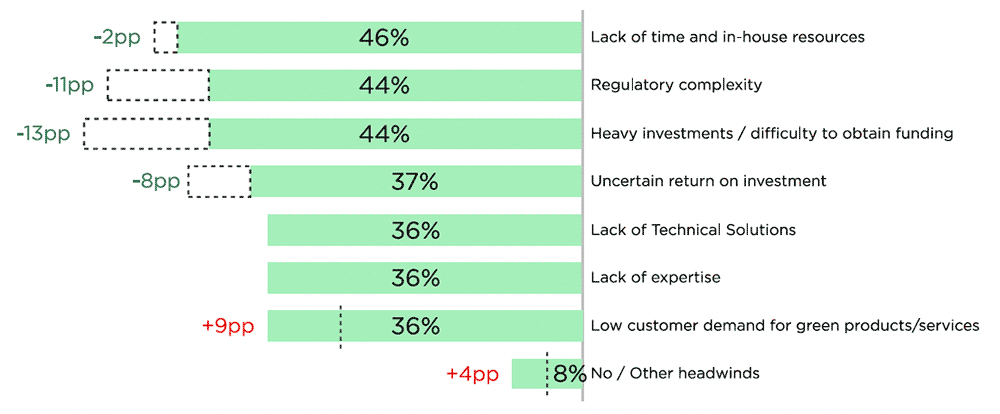

Regulators, investors, governmental agencies, business partners, solution providers, need to sustain their efforts for ensuring a sustained transition of small and mid-market companies towards sustainability. The importance of ongoing support is emphasised by the long-term nature of the transition process, where results may take time to fully materialize. Indeed, only 29% of mid-market companies that have invested «significantly» or «strongly» report impacts that match their expectations. Continuous guidance throughout the decarbonisation process, from strategy formulation to investment execution, is crucial for mid-market companies to sustain their efforts and unlock the full potential of their transition.
As companies advance in their decarbonisation journey, midmarket companies increasingly recognise the extensive transformation and significant investments required. Beyond achieving initial “quick wins”, mid-market companies’ managers need to ensure they are using the right strategies, employing the best technologies, and maintaining the resilience of their business models. Committing to these actions while managing daily operations and navigating disruptions in an increasingly complex world, might be especially challenging in the mid-market companies environment, where resources are limited. On the other hand, the growing demand for more resources and knowledge might be the evidence of a stronger willingness to act for decarbonisation among these companies.











